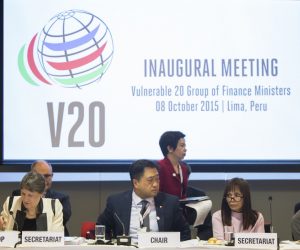Climate Vulnerable Economies Seek Bolder Global Prosperity Plan
Dhaka, 17 Dec 2020 — The Senior Officials of Vulnerable Group of Twenty (V20) Ministers of Finance of the Climate Vulnerable Forum today unveiled its new Climate Prosperity Plan, a manifesto for the transformation of the global economy, as the threat of climate change looms over them.
“We face unprecedented, concurrent crises at this point of history with our economies having been disrupted by the pandemic in tandem with macro-scale climate disasters” said Fatima Yasmin, Secretary, Economics Relations Division, Ministry of Finance, People ’s Republic of Bangladesh and Representative of the Chair of the V20. “As the V20 Presidency, we seek to construct a holistic response that would entail economy-wide investment agenda avoiding the compartmentalization of the past, one that delivers effective protections, improved economic opportunities and enhanced resilience”, she added.
The V20 aims to catalyze transformation of the V20 economies within a decade, starting with 5 years of fast-tracked actions for achieving climate prosperity and reversal of systemic climate vulnerability, and ultimately move towards becoming systemically climate resilient economies by 2030.
“Our goal is improvement of key socio-economic growth outcomes by optimizing core economic and climate responses within the real economy. This means including national and disposable income, poverty reduction, investment, jobs, economic stability, trade balance, energy-cost savings, and other critical socio-economic targets/results in the Climate Prosperity Plan”, Fatima Yasmin said.
KEY ELEMENTS OF THE CLIMATE PROSPERITY PLAN
1. Leverage and scale up the first mobilizations of trillions of dollars in new economic investments needed by 2030 in critical infrastructure and services to deliver climate prosperity from international, regional and domestic sources. Seek optimized, high prosperity outcomes to deliver fast-paced disposable income growth, positive welfare effects, improved trade and other critical socio-economic results, and at the same time rapidly accelerate our resilience to climate dangers and low and zero carbon deployments.
2. Achieve a sustainable trajectory for overcoming the capital constraints in financing highly-capital-intensive, climate-smart investments (the costs of capital are increasing because of climate change). Directly unlock at least USD 30 billion of private sector investments through more systematic and optimized financial de-risking for resilient infrastructure and renewable energy working through MDBs and national financing institutions.
3. Cut in half the 98% prevailing V20 financial protection access gap for climate and disaster risks by supporting the development of the domestic disaster risk financing and insurance sector and focusing particularly on the protection of micro, small and medium-sized enterprises (MSMEs).
4. Create more jobs, specially increase the share of quality jobs, than would be possible through business-as-usual development, ensuring no workers are left behind in the transition to climate resilient, low-carbon economies. This shall be done through adequate and responsive wage-replacement support and worker re-skilling and employment programs, while pursuing strategies to ensure adequate and effective protection for workers from rising climate risks in the workplace.
Since the Paris Agreement took effect, it became clear that growing exposure to climate risks creates instability in the world economy — this is especially so, given that V20 countries are engines of global growth with consistently high average rates of economic expansion exceeding 5% per year. What affects V20 countries will increasingly impact the world economy, just as the V20 bears the brunt of the impacts of climate change and concurrent global crises. There needs to be a systematic and universal consideration of climate risk and for special financial assistance mitigating climate crisis impacts, including reforming international crisis finance and premium support for V20 financial protection against climate and disaster risks. Protecting the V20 economies will only ensure continued expansion of the global economy.
“In light of the human and economic toll of the COVID-19 pandemic, we recognize that avoidance of future macro-catastrophe risks to ours and the global economy such as these climate risks, will require science to be at the core of our strategic and investment decisions. Working within the V20, and together with the G20, OECD, International Financial Institutions and the Multilateral Development Banks, it will be an urgent priority to recalibrate markets, technologies, and financing towards more resilient and sustainable economic futures,” Bangladesh Economic Relations Division Secretary Fatima Yasmin opined.
The next V20 Ministerial Dialogue will take place during the 2021 World Bank/IMF Spring Meetings. Within the auspices of the World Bank and IMF, the V20 has been advocating for adhering to the US$100 billion in climate finance pledged by developed countries in support of developing countries’ climate action. The developed economies have fallen short in their delivery targets for distributing the US$100 billion.
Formed in 2015, the V20 Group of Finance Ministers is a dedicated cooperation initiative of economies systematically vulnerable to climate change. It is currently chaired by the People’s Republic of Bangladesh. The V20 membership stands at 48 economies including Afghanistan, Bangladesh, Barbados, Bhutan, Burkina Faso, Cambodia, Colombia, Comoros, Costa Rica, Democratic Republic of the Congo, Dominican Republic, Ethiopia, Fiji, The Gambia, Ghana, Grenada, Guatemala, Haiti, Honduras, Kenya, Kiribati, Lebanon, Madagascar, Malawi, Maldives, Marshall Islands, Mongolia, Morocco, Nepal, Niger, Palau, Palestine, Papua New Guinea, Philippines, Rwanda, Saint Lucia, Samoa, Senegal, South Sudan, Sri Lanka, Sudan, Tanzania, Timor-Leste, Tunisia, Tuvalu, Vanuatu, Viet Nam and Yemen.
For more information:
Email: [email protected]
Website: https://www.v-20.org
On Twitter: @V20Group





